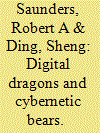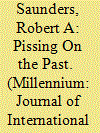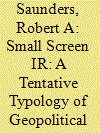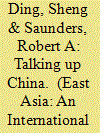|
|
|
Sort Order |
|
|
|
Items / Page
|
|
|
|
|
|
|
| Srl | Item |
| 1 |
ID:
072118


|
|
|
|
|
| Publication |
2006.
|
| Summary/Abstract |
This article compares and contrasts the Internet-based national identity projects of overseas Chinese and near abroad Russians. Our study, which is based on two diasporic communities of similar size and both characterized by a historical weakness of national identity, finds that while Internet use seems to be increasing nationalism and reifying national identity among the ethnic Chinese living in the Pacific Rim, it is paradoxically dampening nationalism and weakening national identity among the Russians living in post-Soviet space. Our thesis is that this divergence results from a combination of factors rooted in the real world, not the virtual. These factors include: the perceived benefits of stressing national identity in ingroup/outgroup interactions, conflicts or competition with other identity anchors, and the political and economic stature of their respective ethnic homelands.
|
|
|
|
|
|
|
|
|
|
|
|
|
|
|
|
| 2 |
ID:
188538


|
|
|
|
|
| Summary/Abstract |
Drawing on analytic frameworks from feminist IR’s interrogation of fear in geopolitics and approaches rooted in the popular culture-world politics (PCWP) continuum, this article examines the ways in which the television series Counterpart (STARZ, 2017–2019) presaged a world defined by a novel form of ideological xenophobia and apolitical anthropophobia at the global level. As a premier example of immersive geopolitical television, the series examines diplomacy, biopolitics, and everyday attitudes to international relations via a screened imaginary that very much resembles our so-called ‘real world’ in the midst of the COVID–19 pandemic, while also auguring the likely reality to come. As I argue, our ‘new normal’ parallels many of the ‘other-worldly’ geopolitical codes and visions presented in Counterpart, thus explaining renewed interest in the series since early 2020. Focusing on the policing of bodies and borders in the time of COVID–19, I examine the series’ discursive and visual world-building against various ‘real-world’ governmental and societal responses to the ‘virus’. This is done through the lens of a new, global geopolitical thinking that is founded in the fear of (other) humans who are/might be (un)knowing carriers of the virus. Using Counterpart as a tool to think with, I attempt to bind geopolitics – an imagined/imaginary system of power relations based on limits and control – to anxieties triggered by the wide-ranging and uncontrollable flows of the novel coronavirus.
|
|
|
|
|
|
|
|
|
|
|
|
|
|
|
|
| 3 |
ID:
078249


|
|
|
|
|
| Publication |
2007.
|
| Summary/Abstract |
This article explores the controversy surrounding Borat Sagdiyev - the fictitious Kazakhstani reporter whose foibles mock Kazakhstan in particular and post-Soviet culture in general. With his appearances on Da Ali G Show, Sacha Baron Cohen's Borat persona long ago became the bête noire of the Kazakhstani government. However, when Borat was selected to host the MTV Europe Music Awards, the dispute over Borat's authenticity as a Kazakhstani became an international incident. In response to his negative portrayal of Kazakshilik (Kazakhness) through the deterritorialized medium of MTV, the government of President Nazarbayev threatened Baron Cohen with legal action and brought down his web site borat.kz. Baron Cohen immediately responded in character via his new domain (.tv) and defended the actions of Kazakhstan, thus fuelling the controversy. The ongoing feud has prompted an interesting postmodern praxis - one in which a fictional persona and national government can carry on a mass-mediated dialogue. As I document the details of this ongoing conflict on the global and local levels, I seek to explain the changes in the international system which have enabled this intriguing paradox. In doing so, I attempt to draw some larger conclusions on the importance of protecting national identity in the postmodern era, especially from threats (both internal and external) which weaken a country's global brand
|
|
|
|
|
|
|
|
|
|
|
|
|
|
|
|
| 4 |
ID:
167420


|
|
|
|
|
| Summary/Abstract |
When and where one can urinate is increasingly politicised around the globe. As an example of bio-political power, the provision, regulation and access to public toilets reflects larger structures in any given society. However, there is another side to micturition, that is the use of urine as a manifestation of bodily power over another/others. This article analyses the politics of the urinal through a close reading of the men’s toilet in The Lismore pub in Partick, Scotland, thus bringing together these two threads via the concept of everyday effigial resistance. In our interrogation of a politicised urinal that asks users to ‘piss’ on historical figures associated with the Highland Clearances, we aim to push International Relations to follow Enloe’s call for the study of ‘mundane practices… and the most intimate spaces’ by considering the most banal aspects of the human condition as part of its remit. Our case study serves as an explicit political intervention, one which through its geographic and geopolitical scales makes an argument for engaging with the mundane, vernacular and vulgar in everyday IR.
|
|
|
|
|
|
|
|
|
|
|
|
|
|
|
|
| 5 |
ID:
151832


|
|
|
|
|
| Summary/Abstract |
Treating popular geopolitics as an interdisciplinary environment, this essay interrogates the viability of employing popular geopolitics as a tool for understanding the relationship between the popular and the political on the international stage as it relates to the Russian Federation. Using several representative artefacts of pop-culture and their reception, we attempt to demonstrate that a powerful trans-regional feedback loop has been established, wherein Russian and ‘Western’ currents feed into and off of each other. These flows sustain older geopolitical codes and frames, while steadily developing new patterns and dimensions of exchange that ‘explain’ variations triggered by the vagaries of globalisation.
|
|
|
|
|
|
|
|
|
|
|
|
|
|
|
|
| 6 |
ID:
157591


|
|
|
|
|
| Summary/Abstract |
We draw on work on popular culture, critical geopolitics, visual politics, affect and the everyday in order to develop a framework for the analysis of the ritual of beer consumption as discursive intervention. Specifically, we argue the need for International Relations to expand theories of visual politics to a broader ‘sensory politics’, incorporating taste, smell, and touch. For our case study, we explore the empirical contestation of dominant geopolitical discourses, critically analysing the production and consumption of two explicitly and intentionally political beers: Norwegian brewery 7 Fjell’s release of ‘The Donald Ignorant IPA’; and Scottish BrewDog’s production of ‘Hello, My Name is Vladimir’. Conceptualising the ritual of these beers’ consumption as affective, effigial, and corporeal discursive interventions, we encourage a move beyond the visual to the sensory, in order to make sense of beers’ (limited) potential for resistance within everyday IR.
|
|
|
|
|
|
|
|
|
|
|
|
|
|
|
|
| 7 |
ID:
167144


|
|
|
|
|
| Summary/Abstract |
Daniel Drezner recently stated: ‘We live in a Golden Age of international relations programming on television’; however, while geopolitical television dramas have flourished since the new millennium, IR scholars and political geographers have paid relatively little attention, instead focusing more attention on films. Given the capacity of television series to respond to headlines from around the world, as well as cater to audience tastes, the medium provides a substantively different platform for engaging and interrogating world affairs and negotiating geopolitical realities. In this article, I will discuss the emergence of the so-called geopolitical TV or small screen IR, and examine how technological advances and social transformations have created conditions for increasingly sophisticated offerings that interrogate a wide variety of issues in world politics. Addressing the shift towards more intellectually demanding fare since 2001, I provide a brief overview of the evolution of geopolitical TV since 2001, focusing initially on American dramas such as Lost, The Wire and 24, before moving on to more recent examples of geopolitically inflected programming which include case studies from Norway, Sweden, Denmark, Germany, and the US. In its empirical and structural contributions, this article provides a tentative typology of the genre, classifying geopolitical television series into five distinct groups with a representative empirical case study for each: 1) exotic-irrealist (Berlin Station); 2) parliamentary-domestic (Borgen); 3) procedural-localised (The Bridge); 4) historical-revisionist (Deutschland 83); and 5) speculative-fantastical (Occupied). In its normative and theoretical contributions, this article seeks to advance the study of small screen geopolitical interventions, arguing that geopolitical television series function both as a mirror/reflection of IR and an imaginative/predictive force in contemporary world politics.
|
|
|
|
|
|
|
|
|
|
|
|
|
|
|
|
| 8 |
ID:
075669


|
|
|
| 9 |
ID:
111641


|
|
|
|
|
| Publication |
2012.
|
| Summary/Abstract |
In recent years, zombies have enjoyed a dramatic renaissance in various forms of popular culture. This essay argues that the current obsession with the walking dead, and particularly the looming threat of human-zombie conflicts, is a reflection of the dangers of invasive alterity associated with uncontrolled spaces in a globalised world. This shift is especially prevalent in the United States following 9/11, as zombies have become phantasmal stand-ins for Islamist terrorists, illegal immigrants, carriers of foreign contagions, and other 'dangerous' border crossers. Through three case studies which examine zombie 'outbreaks' on the local, national, and global levels, respectively, I discuss the importance of borders and geopolitical spaces in recent fictional depictions of human-zombie conflicts. As metaphors for illicit globalisation, zombies have emerged as a key pop-culture referent of the porous nature of socio-cultural, political, and physical boundaries in a global age defined by an emotional geopolitics of fear.
|
|
|
|
|
|
|
|
|
|
|
|
|
|
|
|
|
|
|
|
|